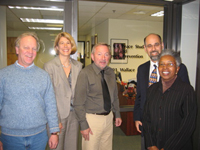USIP Assists Virginia Tech in Peace Center Effort
 USIP’s mandate emphasizes preventing and resolving violent international conflict, developing skills in conflict management and promoting post-conflict development. The Institute often pursues these goals in conflict zones in remote corners of the globe. But closer to home, USIP recently entered a partnership that has its roots in one of the worst domestic tragedies in American history.
USIP’s mandate emphasizes preventing and resolving violent international conflict, developing skills in conflict management and promoting post-conflict development. The Institute often pursues these goals in conflict zones in remote corners of the globe. But closer to home, USIP recently entered a partnership that has its roots in one of the worst domestic tragedies in American history.
Several USIP specialists have begun work with Virginia Tech to help develop its nascent Center for Peace Studies and Violence Prevention (CPSVP), which the university created after the tragic April 2007 shootings that left more than 30 dead. The center’s goal is to “create and facilitate transdisciplinary research, education, and engagement opportunities that promote peace, prevent violence, and advance human security on a global scale.” CPSVP leverages Virginia Tech’s unique strengths in agriculture and economics to aid peacebuilding efforts worldwide. Professor Jerzy Nowak, a horticulturalist whose wife Jocelyne perished in the shootings, was selected to direct CPSVP.
USIP became involved in the project after learning of the new center’s creation shortly before the June 2008 USIP headquarters groundbreaking. The Institute invited Nowak to be a special guest at the groundbreaking ceremony and share Tech’s plans for the center with Institute staff. While in Washington, Nowak expressed an interest in developing a program that would include both domestic violence prevention and a strong global dimension focused on peace studies and economics and conflict.
In October 2008, USIP specialists traveled to Blacksburg to meet and consult with faculty and students involved in CPSVP, including the university’s provost. The USIP team delivered presentations to the Virginia Tech community on peace studies, leadership and conflict, and economics and conflict. Jennings Randolph Senior Fellow Keith Watenpaugh delivered a public lecture on "Learning from Genocide.” Additional USIP specialists included Willene Johnson, David J. Smith and Lauren Van Metre from the Education and Training Center/Domestic (ETC/D).
ETC/D Vice President Pamela Aall noted that including Johnson was extremely valuable in light of the course in Economics and Conflict she teaches as part of USIP’s Conflict Management Education and Training Courses. Such participation exemplifies USIP’s convening power to build bridges between related institutions.
USIP brings neutrality to this project and strives to support — but not direct — the establishment of a center that mirrors Virginia Tech’s larger institutional strengths. “We can offer them feedback and insights on what is taking place in higher education across the U.S.,” says Smith. Van Metre observes that the university houses a spectrum of international programs in international studies, language, architecture and other fields. CPSVP expects to coordinate these programs and build on Virginia Tech’s identity as a global innovator. USIP is viewed as a neutral source to help the university bring these ideas to fruition.
These efforts carry a larger significance for USIP. Aall recalls that for 15 years, the Institute has helped colleges and universities around the country develop courses on conflict management as part of the Institute’s identity as a national institution. Aiding Virginia Tech, she observes, is “particularly appropriate,” because of the need to heal shared trauma, fear and anger. “Institutionally, they have this collective experience,” she observes, citing parallels with global conflicts in which USIP has worked.
Another benefit of the synergy between the CPSVP and USIP relates to USIP’s efforts to train practitioners from a variety of backgrounds in conflict resolution. CPSVP is pursuing a similar effort to enable specialists with technical skills in fields such as agriculture to contribute to international peacebuilding. In this sense, the two institutes can learn from each other’s efforts.
USIP has now included Virginia Tech in its community of local institutions of higher education. Smith notes that USIP must be “prepared to engage with partners that are positioned to teach global peace and help them formulate their vision.” CPSVP is an “institution where what we do fits perfectly with what they want to do,” says Van Metre.
Resources
- Virginia Tech Center for Peace Studies and Violence Prevention
- Roanoke Times story on USIP visit
- Peacework – Virginia Tech-based organization to alleviate poverty through economic development
- Virginia Tech University